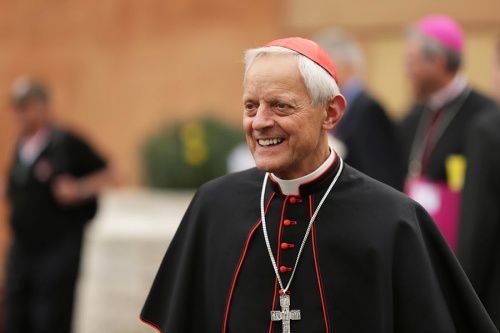Church workers have to lead people toward Catholic teaching in their public lives, not away from it, the Archbishop of Washington has said. His comments follow the firing of a part-time church cantor after his D.C.-area parish learned he was in a same-sex marriage.
“When a person involved in ministerial activity offers a counter-witness to Catholic teaching by words or public conduct, however earnest they may be, experience shows that it can lead people away from the truth and otherwise have an adverse effect on our mission,” Cardinal Donald Wuerl said in a Dec. 31 blog post. “The Church not only must be free to then take corrective steps, it has an obligation in charity and truth to do so.”
He added: “no one can claim a right simultaneously to work for the Church and to work against her belief.”
“The Catholic faithful, and the other people that our ministries serve, have a right to the Gospel and to receive authentic Church teaching,” the cardinal continued. People are denied that right “either through explicit dissent, mis-catechesis or personal conduct that tends to draw people away from the communion of the Church.”
Jeffrey Higgins, 29, was for about one and a half years a part-time cantor and choir member at Mother Seton Catholic Church in Germantown, Maryland, 30 miles northwest of Washington, D.C. He led songs in public worship in the church sanctuary.
He had read and accepted the Washington archdiocese’s employment policies and code of conduct, which included requirements to act in a manner consistent “with the official teachings, doctrines, laws and policies of the Roman Catholic Church.”
Higgins said he was “shocked” when the parish's pastor, Father Lee Fangmeyer, asked him to resign his position Nov. 8 due to the discovery that he was in a same-sex marriage, the former church worker told ABC7 News of Washington, D.C.
“I told him I wouldn't resign, that I liked my job, that I was good at my job, and I didn't see the need to resign,” Higgins said. “He told me I'd been an asset to the music program at Mother Seton and that I'd be missed, but that I was terminated as of that moment.”
Cardinal Wuerl alluded to the case in his Dec. 31 blog post. He said that Catholic parishes, schools, and other entities, as well as their employees, have the task “to lead people to Jesus.”
“That purpose and task is challenged by a secular culture that is in contradiction to traditional concepts of marriage, family, the common good and objective right and wrong.”
The cardinal said the Church recognizes the need to grow in faith and closeness to God.
“Simply acting contrary to Church teaching on occasion would not preclude serving as a ministerial employee or volunteer,” he explained.
Acknowledging we are sinners admits a failure to live up to the truth, he said.
“On those occasions, we are expected to acknowledge our failings and seek to amend our lives in Christ,” Cardinal Wuerl added. “However, if one persists or effectively insists that they are right and the Church is wrong, in the face of such irreconcilable differences it is not discrimination or punishment to say that continued ministerial service is not possible.”
Continued service is “untenable” when conduct “might lead people astray regarding the Catholic faith.”
When Higgins first appealed his firing to the Archdiocese of Washington, Auxiliary Bishop of Washington Barry Knestout responded. The bishop sent a Dec. 7 letter noting that Higgins had signed the archdiocesan employment policy.
He said Higgins’ civil marriage was a public act “incompatible with a position as a liturgical minister in the Church.” Bishop Knestout emphasized that Higgins is still welcome in the Church.
“The issue, in this case, clearly became not the sexual preference of the music minister but his ability to publicly and authentically manifest the teaching of the Church,” the archdiocese told ABC7 News.
The dissenting Catholic group Dignity USA objected to Higgins’ firing. The LGBT activist group was a recipient of a $200,000 Arcus Foundation grant for a coalition “to support pro-LGBT faith advocates to influence and counter the narrative of the Catholic Church” and what the foundation grant listing described as “its ultra-conservative affiliates.”

